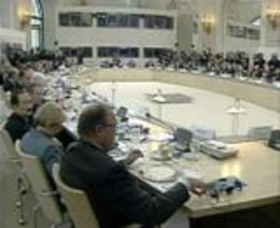Intergovernmental conference, IGC

- Meeting room at the Laeken Summit (Photo: EU Commission)
Intergovernmental conference, IGC
An IGC is a decision-making method in the EU. Any decisions reached must be made unanimously by all member states. The EU treaties can only be amended after an IGC at which every member state is represented.
The result of an IGC becomes a treaty, which is sent to the member states for ratification. Before a treaty can enter into force it is ratified in line with the constitutional provisions of each state.
The proposal for an EU Constitution drawn up by the Convention was submitted on 4 October 2003 to the Heads of State and Government in Rome for the opening of the Intergovernmental Conference and was finalised in Brussels 18 June 2004.
The ten member states joining the EU on the 1 May 2004 were fully participating on an equal footing with the current member states at that time. The then three candidate countries - Bulgaria and Romania, which both became members of the EU on the 1 January 2007 - and Turkey, took part in IGC meetings as observers.
The Lisbon Treaty states that the European Council, deciding by simple majority, might convene a Convention composed of representatives of the European Parliament, the national parliaments, the national governments and the EU Commission. This Convention will then adopt amendments to the treaties by common accord. These amendments will then need to be ratified by all the Member States.
According to the Lisbon Treaty Art. 48.6-7 TEU, the Prime Ministers and Presidents are permitted to change all articles on unanimity to qualified majority and change special procedures to co-decision. Although the national parliaments have the right of veto, the use of that general “passerelle” does not require ratifications by the member states.
In the frame of the simplified revision procedure, as proposed in Art. 48.2-3 TEU, the European Council may amend all or part of the provisions of Part Three of the Treaty on the Functioning of the European Union. The use of that clause however does require ratifications by the member states.
Links
European Convention http://european-convention.eu.int
The IGC Watch http://euobserver.com/?aid=12963
